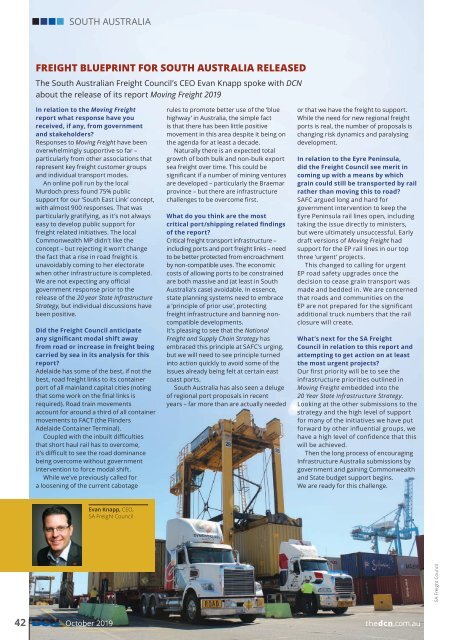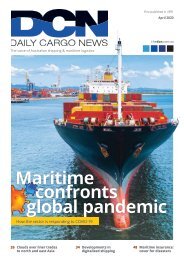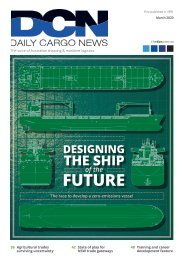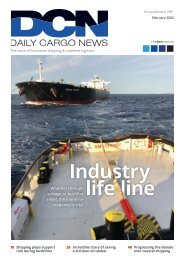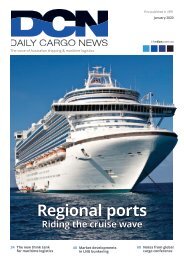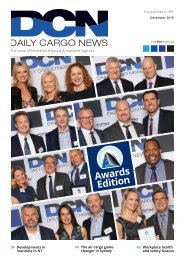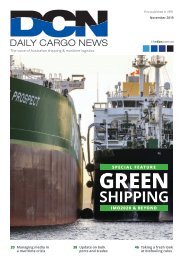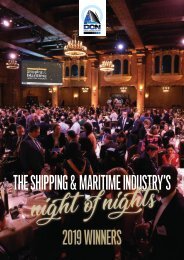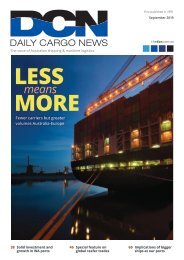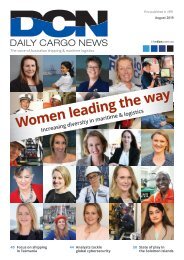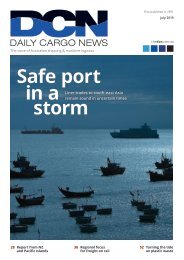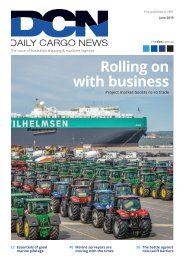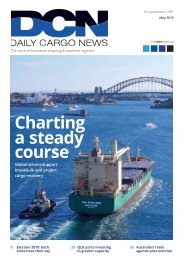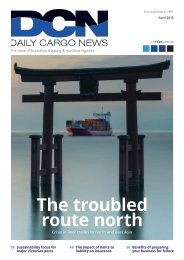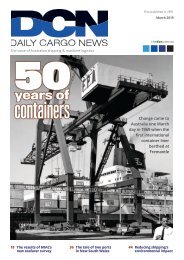DCN October Edition 2019
You also want an ePaper? Increase the reach of your titles
YUMPU automatically turns print PDFs into web optimized ePapers that Google loves.
SOUTH AUSTRALIA<br />
FREIGHT BLUEPRINT FOR SOUTH AUSTRALIA RELEASED<br />
The South Australian Freight Council’s CEO Evan Knapp spoke with <strong>DCN</strong><br />
about the release of its report Moving Freight <strong>2019</strong><br />
In relation to the Moving Freight<br />
report what response have you<br />
received, if any, from government<br />
and stakeholders?<br />
Responses to Moving Freight have been<br />
overwhelmingly supportive so far –<br />
particularly from other associations that<br />
represent key freight customer groups<br />
and individual transport modes.<br />
An online poll run by the local<br />
Murdoch press found 75% public<br />
support for our ‘South East Link’ concept,<br />
with almost 900 responses. That was<br />
particularly gratifying, as it’s not always<br />
easy to develop public support for<br />
freight related initiatives. The local<br />
Commonwealth MP didn’t like the<br />
concept – but rejecting it won’t change<br />
the fact that a rise in road freight is<br />
unavoidably coming to her electorate<br />
when other infrastructure is completed.<br />
We are not expecting any official<br />
government response prior to the<br />
release of the 20 year State Infrastructure<br />
Strategy, but individual discussions have<br />
been positive.<br />
Did the Freight Council anticipate<br />
any significant modal shift away<br />
from road or increase in freight being<br />
carried by sea in its analysis for this<br />
report?<br />
Adelaide has some of the best, if not the<br />
best, road freight links to its container<br />
port of all mainland capital cities (noting<br />
that some work on the final links is<br />
required). Road train movements<br />
account for around a third of all container<br />
movements to FACT (the Flinders<br />
Adelaide Container Terminal).<br />
Coupled with the inbuilt difficulties<br />
that short haul rail has to overcome,<br />
it’s difficult to see the road dominance<br />
being overcome without government<br />
intervention to force modal shift.<br />
While we’ve previously called for<br />
a loosening of the current cabotage<br />
rules to promote better use of the ‘blue<br />
highway’ in Australia, the simple fact<br />
is that there has been little positive<br />
movement in this area despite it being on<br />
the agenda for at least a decade.<br />
Naturally there is an expected total<br />
growth of both bulk and non-bulk export<br />
sea freight over time. This could be<br />
significant if a number of mining ventures<br />
are developed – particularly the Braemar<br />
province – but there are infrastructure<br />
challenges to be overcome first.<br />
What do you think are the most<br />
critical port/shipping related findings<br />
of the report?<br />
Critical freight transport infrastructure –<br />
including ports and port freight links – need<br />
to be better protected from encroachment<br />
by non-compatible uses. The economic<br />
costs of allowing ports to be constrained<br />
are both massive and (at least in South<br />
Australia’s case) avoidable. In essence,<br />
state planning systems need to embrace<br />
a ‘principle of prior use’, protecting<br />
freight infrastructure and banning noncompatible<br />
developments.<br />
It’s pleasing to see that the National<br />
Freight and Supply Chain Strategy has<br />
embraced this principle at SAFC’s urging,<br />
but we will need to see principle turned<br />
into action quickly to avoid some of the<br />
issues already being felt at certain east<br />
coast ports.<br />
South Australia has also seen a deluge<br />
of regional port proposals in recent<br />
years – far more than are actually needed<br />
or that we have the freight to support.<br />
While the need for new regional freight<br />
ports is real, the number of proposals is<br />
changing risk dynamics and paralysing<br />
development.<br />
In relation to the Eyre Peninsula,<br />
did the Freight Council see merit in<br />
coming up with a means by which<br />
grain could still be transported by rail<br />
rather than moving this to road?<br />
SAFC argued long and hard for<br />
government intervention to keep the<br />
Eyre Peninsula rail lines open, including<br />
taking the issue directly to ministers,<br />
but were ultimately unsuccessful. Early<br />
draft versions of Moving Freight had<br />
support for the EP rail lines in our top<br />
three ‘urgent’ projects.<br />
This changed to calling for urgent<br />
EP road safety upgrades once the<br />
decision to cease grain transport was<br />
made and bedded in. We are concerned<br />
that roads and communities on the<br />
EP are not prepared for the significant<br />
additional truck numbers that the rail<br />
closure will create.<br />
What’s next for the SA Freight<br />
Council in relation to this report and<br />
attempting to get action on at least<br />
the most urgent projects?<br />
Our first priority will be to see the<br />
infrastructure priorities outlined in<br />
Moving Freight embedded into the<br />
20 Year State Infrastructure Strategy.<br />
Looking at the other submissions to the<br />
strategy and the high level of support<br />
for many of the initiatives we have put<br />
forward by other influential groups, we<br />
have a high level of confidence that this<br />
will be achieved.<br />
Then the long process of encouraging<br />
Infrastructure Australia submissions by<br />
government and gaining Commonwealth<br />
and State budget support begins.<br />
We are ready for this challenge.<br />
Evan Knapp, CEO,<br />
SA Freight Council<br />
SA Freight Council<br />
42 <strong>October</strong> <strong>2019</strong><br />
thedcn.com.au


